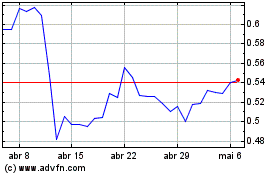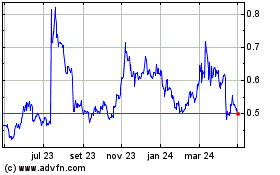Ethereum supply increase could push price downward
Last week, 7,728 Ethereum tokens (COIN:ETHUSD) were added to
circulation, raising the supply to 120.39 million ETH, the highest
in six months. This increase, without corresponding demand, could
pressure the price downward. Ethereum network activity also fell by
3%, negatively affecting transaction fees. ETH is currently priced
at $2,623, with support at $2,579. If demand continues to decline,
the price could drop to $2,264.
Chainlink launches protocol for private transactions targeting
institutional adoption
Chainlink (COIN:LINKUSD) has launched CCIP Private Transactions,
a tool ensuring privacy and regulatory compliance for blockchain
transactions. ANZ will be one of the first institutions to test the
protocol for tokenized asset settlement under Singapore’s Project
Guardian. The protocol aims to protect data in private cross-chain
transactions, allowing financial institutions to securely and
efficiently use blockchains with full end-to-end privacy.
Bitcoin faces pressure with liquidations and option expirations
Bitcoin (COIN:BTCUSD) fell 0.30% in the past 24 hours, trading
at $67,142. Its intraday low reached $66,535 after the weekend’s
surge to nearly $70,000 faltered. The decline coincided with rising
U.S. Treasury yields affecting risk assets. Liquidations of long
positions totaling $165 million added pressure. With billions in
BTC and ETH options expiring, volatility is expected in the coming
days, especially regarding “in-the-money” calls, particularly in
BTC.
Bitcoin ETFs see strong inflows, while Ethereum ETFs face outflows
On October 21, Bitcoin ETFs gained $294.29 million in net
inflows. BlackRock’s iShares Bitcoin Trust (NASDAQ:IBIT) led with
$329.03 million in inflows, followed by Fidelity’s Wise Origin
Bitcoin Trust (AMEX:FBTC), which raised $5.9 million. Other funds
recorded outflows. Meanwhile, Ethereum ETFs saw $20.8 million in
net outflows. The iShares Ethereum Trust (NASDAQ:ETHA) and VanEck
Ethereum Trust (AMEX:ETHV) saw modest inflows, while Grayscale
Ethereum Trust (AMEX:ETHE) had $29.58 million in withdrawals.
Buenos Aires launches digital identity with focus on privacy
Buenos Aires has launched QuarkID, a digital identity service
using zero-knowledge proofs (ZK) to enhance resident privacy.
Integrated into the miBA app, it allows document verification
without revealing irrelevant personal information. The solution
uses Ethereum’s ZKsync Era network as a security anchor, preventing
fraud and reducing identity theft risks. The service is free for
users and is being tested in other Argentine regions, including
Jujuy and Mendoza, with potential national expansion.
Ras Al-Khaimah launches legal framework for DAOs in digital free
zone
Ras Al-Khaimah, UAE, has launched DARe, a new legal framework
for DAOs in its RAK Digital Assets Oasis free zone. The regime
provides legal and tax support for DAOs, enabling interactions with
the off-chain world, such as opening bank accounts and owning
assets. DARe includes models for emerging projects and mature DAOs,
aiming to optimize the growth of the blockchain and digital
ecosystem.
Realms seeks profit with new crypto governance services
Created by Solana Labs to manage DAO policies, Realms is under
new leadership and seeks profitability. The “Realms Today Trust”
will expand its offerings with consulting and financial services
for DAOs, capturing part of $1.5 billion in crypto assets. Public
tools will remain free, while new paid services will include legal
structuring and treasury credit cards.
Pump.Fun nears 1 million SOL tokens in lifetime fees
Pump.Fun, a Solana token issuer, is nearing 1 million SOL tokens
(COIN:SOLUSD) in accumulated fees since March. With over 2.5
million tokens issued and 7,500 released in just 24 hours, the
service has gained popularity, especially in AI-themed memecoins.
The company has raised over $147 million and is one of the most
profitable platforms in the crypto space, projecting $66 million
for 2024.
Sky project considers return to MakerDAO brand after negative
feedback
The DeFi project Sky, formerly MakerDAO (COIN:DAOUSD), is
reconsidering its branding adjustments following community
feedback. In a proposal on October 21, co-founder Rune Christensen
suggested three options: keeping the Sky brand, reverting to
MakerDAO, or adopting a hybrid solution. The rapid growth of the
USDS token and its integration with DeFi platforms like Aave and
Morpho contrasts with concerns over the new identity. The final
decision will be discussed on October 25.
TRON reaches all-time revenue high with on-chain growth in Q3 2024
Messari released a report highlighting TRON’s (COIN:TRXUSD)
continued growth in Q3 2024, reaching $151.2 million in protocol
revenue, up 29% from the previous quarter. TRON also saw
significant growth in market cap, stablecoins, and daily DEX
volume. With initiatives like HackaTRON Season 7 and the creation
of the T3 Financial Crime Unit, the TRON ecosystem continues to
expand its capabilities and attract new users and developers.
Ripple supports bipartisan pro-crypto policies in US elections
Brad Garlinghouse, CEO of Ripple, reaffirmed the company’s
commitment to supporting bipartisan pro-crypto policies ahead of
the upcoming U.S. elections. Garlinghouse emphasized the need to
promote blockchain innovations, criticizing President Biden’s
stance on crypto. Additionally, Ripple co-founder Chris Larsen
donated $10 million in XRP (COIN:XRPUSD) to support Kamala Harris,
aiming to ensure that the U.S. maintains its technological
leadership. Ripple also continues contributing to pro-crypto
SuperPACs.
Avalanche launches Visa card to facilitate crypto payments
The Avalanche Foundation (COIN:AVAXUSD) announced the launch of
the Avalanche Card, a new Visa card allowing users to spend
cryptocurrencies anywhere Visa is accepted. Available in both
physical and virtual formats, the card is linked to a self-custody
wallet. Initially, it will be available to residents in Latin
America and the Caribbean, with support from Rain Liquidity.
According to Cointelegraph, the card does not report to credit
bureaus and has no spending fees.
FSB and BIS call for more regulation to mitigate tokenization risks
The Financial Stability Board (FSB) and the Bank for
International Settlements (BIS) warned about the risks of
tokenization in recent reports, emphasizing the need for increased
regulation. The FSB identified vulnerabilities such as tokenization
of reference assets and the integration of new technologies, while
the BIS highlighted cyber and liquidity risks. Both organizations
stressed that unchecked tokenization could impact global financial
stability, particularly in complex and automated products. Robust
governance is essential to avoid conflicts of interest.
Binance and Crypto.com lose market share as DEXs gain ground
Binance and Crypto.com are losing market share as decentralized
exchanges (DEXs) gain momentum. Binance, for example, saw its spot
trading volume drop 13% over the past year, from 52.5% to 39.5%.
Smaller exchanges like Bybit and Bitget are capitalizing on this
decline, with Bybit rising to the second global position, and
Bitget’s market share growing from 8.2% to 12.7%. Additionally, DEX
trading volumes grew, reaching $250 billion monthly in 2024,
challenging the dominance of centralized exchanges.
Azura launches platform to ease DeFi access with support from major
investors
Azura, a new on-chain aggregation layer, launched today, October
22, aiming to simplify access to decentralized finance (DeFi)
applications. The platform integrates multiple blockchains and
protocols into a single interface, making DeFi more accessible to
new investors, while addressing sector fragmentation and
facilitating DeFi adoption. The startup raised $6.9 million in a
funding round led by Initialized Capital, with participation from
Winklevoss Capital and other prominent investors.
Liminal responds to accusations from WazirX after $235 million hack
During WazirX’s debt restructuring, custody partner Liminal
countered accusations of security violations made by the exchange.
Liminal highlighted that, even after the July hack, WazirX retained
over $175 million in its custody and still holds $50 million in its
wallets. The disclosure of 240,000 wallet addresses was criticized
as potential misinformation.
Core Scientific expands partnership with CoreWeave, projects $8.7
billion in revenue
Core Scientific (NASDAQ:CORZ) expanded its contract with
CoreWeave, adding 120 MW to its high-performance computing (HPC)
hosting capacity. The partnership now totals 500 MW and is expected
to generate $8.7 billion in revenue over 12 years. CoreWeave will
fund $180 million in upgrades, while Core Scientific diversifies
its operations post-bankruptcy and continues investing in AI and
Bitcoin mining.
Bitcoin miners may profit by providing computational power for AI
With Bitcoin halving squeezing profits, miners are exploring
decentralized physical infrastructure networks (DePIN) to monetize
idle GPU resources. These platforms offer affordable computing
power for AI researchers and developers, while miners diversify
their revenue streams. As AI processing demand grows, and miners’
existing infrastructure is leveraged, this partnership between
Bitcoin mining and DePIN could spur innovation in AI and
decentralization, creating an open market for computing
resources.
Ripple (COIN:XRPUSD)
Gráfico Histórico do Ativo
De Set 2024 até Out 2024

Ripple (COIN:XRPUSD)
Gráfico Histórico do Ativo
De Out 2023 até Out 2024
